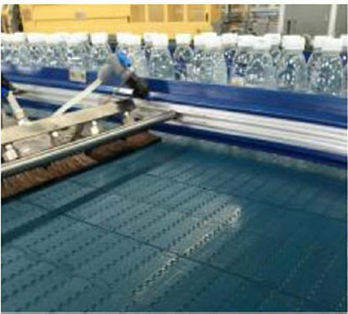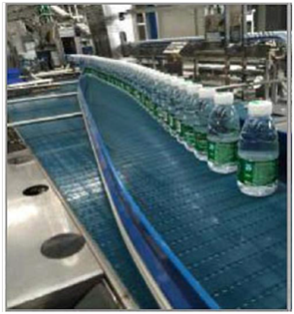
随着科学技术的进步和市场空间的不断扩大,食品饮料行业得到了空前的发展,生产效率需要大幅提高。然而传统的输送带润滑方式已不能满足需求,干、湿润滑逐渐取代传统的润滑方式并成为主流。
概述
集中润滑系统由中央泵站、控制系统、管道和喷嘴组成。
早期输送带的润滑方式采用皂液浸泡槽,即利用浸泡链板的方式用皂液进行润滑。
干式润滑系统因无水零排放的特点,更适合饮料乳品生产线高卫生标准的使用。
湿润滑系统结构简单,使用和维护的成本相比干润滑略低,适用性更广,尤其适合金属链板的润滑。
湿式润滑
湿润滑系统是针对饮料、 啤酒生产线,适合链板的输送润滑,通过分段喷淋间隔停开的功能,最大限度控制水和润滑剂的成本。
干润滑
干润滑系统是专为塑料链板输送所提供的方案,帮助PET及纸盒包装的客户减少润滑用水量99%以上,同时提高输送带的速度减少倒瓶,降低水的使用还可以保持工作环境整洁、地面干燥,从而提高了现场操作人员的安全度,降低设备维护成本,增加生产效率。


湿式润滑和干式润滑的比较 | ||
性能对照 | 湿式润滑 | 干式润滑 |
适用性 | 适用绝大多数输送链 | 只适合塑料类型链板 |
润滑剂 | 润湿, 渗透 | 附着, 成膜 |
现场状况 | 泡沫不可避免 | 无泡沫,无水卫生状况更佳 |
消耗 | 喷淋时间较长, 耗量大 | 喷淋时间短, 耗量少 |
能源消耗 | 需用水稀释, 用水量较大 | 无需水稀释, 环保节能减排 |
运行成本 | 低 | 略高 |
应用
● 啤酒和装瓶厂
● 乳制品行业
● 面包房和糖果糕点厂
● 鱼、肉、水果和蔬菜加工
With the advancement of science and technology and the expansion of market space, the food and beverage industry has seen unprecedented development and the need to significantly improve production efficiency. However, traditional conveyor belt lubrication methods can no longer meet the demand, dry and wet lubrication gradually replace the traditional lubrication methods and become mainstream.
Overview
The centralised lubrication system consists of a central pumping station, control system, pipes and nozzles.
In the early days the conveyor belt was lubricated by soap soaking tanks, i.e. by soaking the chain plates with soap.
Dry lubrication systems are more suitable for beverage and dairy production lines with high hygiene standards due to their water-free and zero discharge characteristics.
The wet lubrication system is simple in structure, slightly less expensive to use and maintain than dry lubrication, and more widely applicable, especially for lubrication of metal chain plates.
Wet lubrication
The wet lubrication system is designed for beverage and beer production lines and is suitable for the lubrication of chain plates. The function of stopping at intervals by means of segmented spraying allows maximum control of water and lubricant costs.
Dry lubrication
The dry lubrication system is a solution specifically designed for plastic chain conveyors, helping PET and carton packaging customers to reduce the amount of water used for lubrication by over 99%, while increasing the speed of the conveyor belt and reducing the number of empty bottles, reducing the use of water and also keeping the working environment clean and the floor dry, thus improving the safety of the operators on site, reducing equipment maintenance costs and increasing production efficiency.
Wet versus Dry Lubrication | ||
Performance | Wet lubrication | Dry lubrication |
Applicability | Suitable for most conveyor chains | Suitable for plastic type chains only |
Lubricant | Wetting, penetrating | Adhesion, film formation |
Field conditions | Foam unavoidable | No foam, better hygiene without water |
Consumption | Long spraying time, high consumption | Short spraying time, low consumption |
Energy consumption | Water dilution required, high water consumption | No water dilution required, environmental friendly and energy efficient |
Operating costs | Low | Slightly higher |
Applications
● Beer and bottling plants
● Dairy industry
● Bakeries and confectionery and pastry factories
● Fish, meat, fruit and vegetable processing